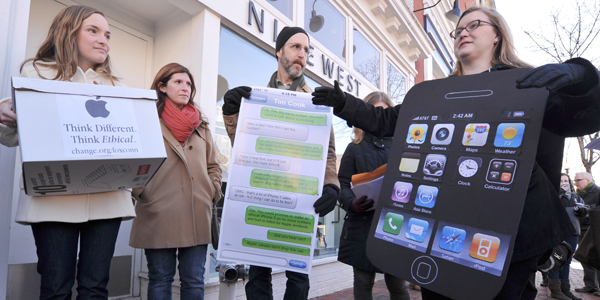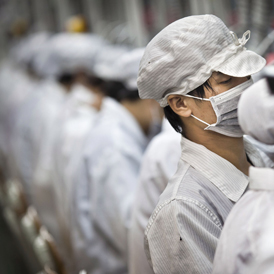Inspections begin at Apple’s Chinese factories
As independent inspectors begin assessing workers’ rights at Apple’s Chinese factories, one analyst tells Channel 4 News that consumers are “not willing to pay the price” for ethically made goods.

The Fair Labor Association has begun inspecting several suppliers, including Foxconn in China, which produces iPads and iPhones.
It comes amid mounting criticism over workers’ rights after a series of fatal accidents and suicides in recent years.
Apple Chief Executive Tim Cook said the move to allow independent assessments by the FLA was “unprecedented”.
“Workers everywhere have the right to a safe and fair work environment. Which is why we’ve asked the FLA to independently assess the performance of our largest suppliers,” Mr Cook said.
‘PR stunt’
Critics have accused Apple of staging a PR stunt, saying Apple is already aware of the severe working conditions in Chinese factories.
Executive Director at China Labor Watch, Li Qiang, told Channel 4 News that the technology giant should stop wasting time on assessments and focus on improving them.
“We already know what Apple’s supplier factories inflict on their workers: long working hours, unsafe working conditions, an exploitive salary system.
“What Apple should do now is to take action to solve these problems and improve the labour conditions in their supplier factories, because it is Apple, not the factories, who bears the ultimate responsibility for them,” he said.
‘All made in the same factories’
The Foxconn factories which are being inspected in Shenzhen and Chengdu are also used to manufacture products for most other big tech firms from Microsoft to Amazon to Nintendo.
But as Apple’s share price surges to $500 per share, workers’ rights have been highlighted due to Apple’s huge profits as market leader.
Techcrunch Editor, Mike Butcher, told Channel 4 News that Apple’s human rights record has become such an issue because of its relationship with customers.
Apple is the lightning rod for this kind of thing because it sells directly to consumers. But Foxconn makes phone for Nokia, Microsoft, you name it. All in the same factories as the iPhone. Mike Butcher, Techcrunch Editor
“Few other electronics giants have been targeted in this way. It’s in part down to the fact that Apple not only designs its products but also sells them direct to the consumer.
“If you got a handset from HTC on a Vodafone contract, who do you blame if there is an issue over how it’s made?
“Apple is the lightning rod for this kind of thing because it sells directly to consumers.
“But Foxconn makes phone for Nokia, Microsoft, you name it. All in the same factories as the iPhone,” Mr Butcher said.

Dangerous conditions
Petitions calling for Apple products such as the iPhone to be made “ethically” have attracted more than 50,000 signatures, following a New York Times investigation into cases of under-age workers and dangerous conditions.
In May 2011, two people were killed after an explosion at a plant in Chengdu.
Months later, Foxconn installed suicide nets to factory living-quarters at its Shenzhen factory after a spate of suicides.
Another Apple supplier, Wintek, also came under heavy scrutiny when 137 workers in eastern China were injured after using a poisonous chemical to polish screens on iPhones.
Are we willing to pay more?
Principal analyst at Ovum, Jeremy Green, told Channel 4 News that while people say they want ethical products, their actions prove differently.
“People want to buy ethically produced products, until they actually have to spend their money.
In an ideal world, everybody would rather buy ethical products, but when it comes to paying the difference, that seems to fall away. Jeremy Green, Analyst
“In an ideal world, everybody would rather buy ethical products, but when it comes to paying the difference, that seems to fall away – whether that’s the difference in terms of price, or in terms of cool.”
The New York Times study estimated that a $200 iPhone would cost about $350 if it were made in American factories. But Mr Green told Channel 4 News that in the current economic climate, people would be even less willing to pay more to see conditions and pay improve in Chinese factories.
He said that while it “wouldn’t be vastly more expensive” to create products ethically, corporations would not address the issue until customers start demanding ethically-made goods.
“Apple have woken up to the fact that a number of people are opposed to workers’ conditions. But to be fair, it did take quite a long while.
“Consumers need to take a more holistic interest in what they’re buying for companies to listen,” Mr Green said.
-
Latest news
-
As India goes to the polls in the world’s largest election – what do British-Indians think?6m

-
Tees Valley: Meet the candidates in one of the biggest contests coming up in May’s local elections4m

-
Keir Starmer says public sector reform will be a struggle7m

-
Nicola Sturgeon’s husband Peter Murrell charged with embezzlement of funds from SNP1m

-
Ukraine might finally get $60billion in American weapons and assistance to defend against Russia3m

-




